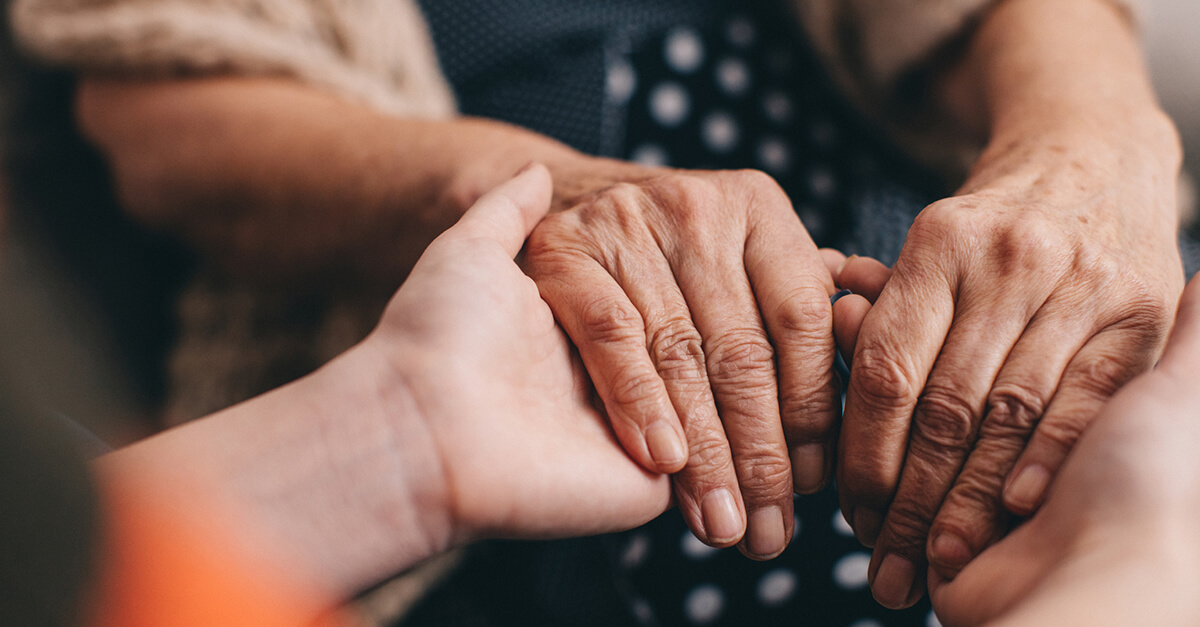4 ways to help a loved one with a mental condition


Mental health conditions affect more than the diagnosed individuals. They can also present special challenges for their family members and loved ones. Every 1 in 5 Americans is diagnosed with a mental health disorder every year. That’s approximately 44 million Americans. If someone you love has a mental health condition, these tips can help you support them, while also making sure you don’t neglect your own mental health needs.
From the community: “My husband suffers from Major Depression, Anxiety, Substance Abuse and has been diagnosed with Bi Polar Disorder. We have been together for approx 8 years and the side effects of his conditions above, set in approx 4 years ago after a “mental breakdown”… I am here looking for support, not only for him but for myself. I feel that I can’t continue putting my well being on the back burner however, I just don’t know what else to do because I care about his well being. In the past we have seen counselors and he has been seeing the same primary care physician for the past 5 years. In the beginning things progressed well… Finding help is not easy especially living in a small town. My husband also has an issue with Self sabotage and tends to derail the progress, in which my reaction is to pick up the pieces. I’m tired.. and beginning to feel hopeless… The last few years have been very difficult and I’m finding myself starting to spiral as well. I don’t have the confidence that I once had, my happiness levels have dropped and I can say without a doubt that I am depressed. I feel that my marriage is failing but I also feel that I can’t leave this amazing person in the state that he is, when I promised to be here for him, for the rest of our lives…” – Inspire member
What is a mental health disorder?
There are more than 200 different types of mental health disorders. These illnesses affect a person’s thoughts, behaviors, and emotions. Some of the more common ones include:
anxiety disorders, including obsessive-compulsive disorder (OCD), post-traumatic stress disorder (PTSD), and phobias
mood disorders like depression and bipolar disorder
psychotic disorders, including schizophrenia, schizoaffective disorders, and paranoia and delusional disorders
attention deficit hyperactivity disorder (ADHD), which causes hyperactive, inattentive, and impulsive behaviors
eating disorders like anorexia nervosa, bulimia nervosa, and binge eating disorder
Steps to support a loved one with a mental condition
Watching a loved one struggle with a mental health condition can make you feel powerless. You can’t take away the diagnosis, cure the illness, or force someone to continue treatments if they’re unwilling. But you can provide them with love and support, while loving and supporting yourself along the way.
Start by taking these actions:
learn more about the mental condition
get help for yourself
become a better listener
find healthy ways to manage stress
Learn more about the mental health condition
Education is vital to helping your loved one and yourself. The more you know and understand about the mental health condition, the better you can serve as that person’s advocate and supporter. While there’s lots of information online, it’s important to remember that mental health conditions affect everyone differently. Some people may have mild, more manageable symptoms, while others may have severe issues that require a variety of medications and treatments.
The best way to find out how a specific condition uniquely affects your loved one is by talking with their doctor (usually a psychiatrist) and their mental health counselor (usually a psychologist, social worker, or other licensed mental health professional). The federal Health Information Portability and Accountability Act (more commonly known as HIPAA) protects the privacy of patients. In order for a doctor or therapist to share information with you about your loved one’s care, you’ll need the patient’s signed consent.
Attending some sessions with your loved one, or doing separate family counseling with a different therapist, can also be beneficial for everyone involved. These sessions provide a safe space for your loved one to share how their illness, as well as your actions, affect them, and it gives you the opportunity to do the same.
From the community: “It just keeps getting worse. My wife keeps hearing voices and noises and is paranoid about all kinds of things. She seemingly cannot see that it’s in her brain and that she desperately needs help. How did you get the help you needed or get your loved one help? She never threatens any harm to herself or others so I cannot get her involuntarily hospitalized.” – Inspire member
Get help for yourself
While family counseling with your loved one is beneficial, it’s also helpful for you to have your own therapist. These sessions provide a safe space for you to vent frustrations without worrying about hurting your loved one’s feelings. You’ll also learn strategies to help you cope with your loved one’s behaviors and the stress that accompanies them.
You can also benefit from having a trusted family member or friend that you can turn to in times of need. If you’re not comfortable sharing details about a private family matter, consider joining an in-person or online support group for loved ones affected by mental illness. Both patients and their loved ones can connect with others on Mental Health America’s mental health support group and community on Inspire.
From the community: “…dealing with a suicidal son (19 with bipolar). His gf of 2 years broke up with him last Friday out of the blue and he is unconsolable. He was hospitalized for 5 days and seemed to be doing better the first 3 days out and the past two have been awful. Crying uncontrollably. Anger. Hitting himself. Saying all he wants to do is die so that the pain stops. He's on meds and did talk to his therapist... today he is saying he won't talk to anymore therapists, quitting his job, and just wants to be left alone. Watching him suffer this way is killing me. I cant seem to do anything right and he is constantly threatening to leave because he is "an adult and can leave whenever he wants". I just feel so alone & scared & quite frankly grossly under qualified to deal with this.” – Inspire member
Become a better listener
Listening is a learned skill that takes time, patience, and practice to master. It’s understandable to want to rush in and help your loved one by offering advice. Yet, most people are looking for someone to simply listen to them without trying to solve their problems (besides, their condition isn’t something you can fix).
These steps can help you improve your listening skills:
Listen to understand: Avoid reactive listening, which means you start formulating counterpoints or arguments before the person is done speaking. Instead, focus on understanding their point of view.
Practice reflective listening: This communication strategy involves repeating a thought or idea back to your loved one to show that you understand them. You might say something like, “Let me see if I have this right. Are you saying…?” or “How does that make you feel?”
Don’t interrupt or criticize: Let the person finish their thoughts, even if you disagree with what they’re saying.
Try not to take criticisms personally: As hard as it is to hear someone criticize your actions, accepting the person’s comments and not having a hostile reaction can go a long way toward keeping communication open and validating that person’s feelings. Try to remember how frustrated your loved one must feel and know that they may be placing blame on you because they know you will always be there for them.
Ask questions: In a nonjudgmental way, try to understand why your loved one has certain thoughts or reactions. It helps to express empathy for what the person is going through.
From the community: “I’ve been on and off in a relationship with a loved one who has depression. We found out only two years ago about a brain tumor that caused this. On top of that there has been a lot of emotional damage caused by his family growing up which only added to his depression and anxiety. When he was diagnosed with depression I did everything I could to learn about it and help... I keep believing in his healing... I hate this mental health illness for everyone because I see what it can do to people and those who love them.” – Inspire member
Find healthy ways to manage stress
Many mental health conditions are lifelong. While treatments like medications and counseling can ease symptoms, some behaviors can persist. Plus, it’s not uncommon for people with certain mental conditions and disorders to stop taking medication. More than half of people with schizophrenia and bipolar disorder don’t think they’re sick. This false belief about their condition is known as anosognosia. Because they don’t think they’re ill, they stop their medication, often without telling anyone. Sometimes people go off a drug because they don’t like the side effects or how the medicine makes them feel. Stopping a medication causes a relapse of symptoms.
It’s emotionally and physically exhausting to live with the constant worry that a loved one won’t follow through with treatment, or may harm themselves or others. It’s important for you to step away from the situation, when possible. If you can’t get away physically, find healthy ways to manage stress like:
practicing meditation, mindfulness, or breathing exercises
focusing on a hobby like painting, gardening, or baking
being physically active by walking, biking, swimming, or doing yoga
escaping by listening to music, watching a funny movie, or reading a book
going out with friends and family
Sources
Helping a loved one cope with a mental illness. American Psychiatric Association.
How to cope when a loved one has a serious mental illness. American Psychological Association. 2015.
Supporting a family member with serious mental illness. American Psychological Association. August 2019.
Mental illness and the family: Recognizing warning signs and how to cope. Mental Health America.
Quick facts and statistics about mental health. Mental Health America.
Supporting a friend or family member with mental health problems. Mental Health.gov. December 2020.
Anosognosia is major reason why some individuals with severe psychiatric disorders often do not take their medications. Mental Illness Policy Org.
Communicating with a loved one who has a mental illness. National Alliance on Mental Illness.
How to love someone with a mental illness. National Alliance on Mental Illness.
Disclaimer
Member comments are lightly edited for length and to remove identifying information but are otherwise reproduced as they appear in the community as part of public posts.
This content is for general informational purposes only and does not necessarily reflect the views and opinions of any organization or individual. The content should not be used as a substitute for professional medical advice, diagnosis, or treatment. Please consult your healthcare provider about any questions you may have regarding a medical condition.




